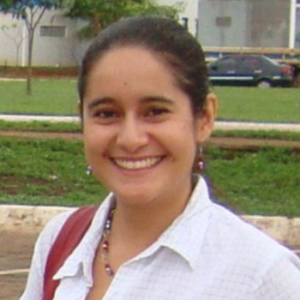Title : Lipases from Brazilian agroindustrial residues aiming to biodiesel production
Abstract:
Enzymatic catalysts play an important role in the industrial sector, because they catalyze many reactions at room temperature and pressure, making the process more economical. Lipases are enzymes that have a great biotechnological potential. Their most common applications are regarding food, leather, cosmetics, detergent and paper. It is also used in, the pharmaceutical, medical and textile industries. But most importantly, it is crucial for a sustainable biodiesel production. However, lipase uses are still limited due to its high production costs. An economical way to produce lipases is through Solid-State Fermentation (SSF) processes by using agroindustrial residues as substrates. Hence, this work aimed to analyze the production of lipolytic enzymes from the fungus Metarhizium anisopliae by solid-state fermentation (FES). Babassu coconut bagasse, soy bran (from oil extraction and soy milk production), broken rice, wheat bran, and corn bran were used as substrates. Pretreatments on the substrates and the use of an inducing agent (olive oil) were carried out to verify their necessity on lipase production. Preliminary experiments showed that for babassu coconut bagasse there is no need for pretreatment. The results showed that there was no statistical difference in lipolytic activity between broken rice and soybean bran when the experiments were performed with or without pretreatment. Pretreatments for corn bran and soybean bran showed a statistical difference in the results. The highest enzymatic activities were obtained for the experiments carried out without pretreatment. Therefore, subsequent fermentations were carried out without pretreatments. Regarding the experiments without using inducers, soybean bran (residues generated after soy milk production) was the one that showed the highest enzymatic activity with. Wheat bran had the lowest enzymatic activity with. Concerning the experiments carried out with the inducer, the substrate that presented the highest enzymatic activity was the babassu coconut bagasse with. Soy bran had the lowest enzymatic activity with. In conclusion, for all the treatments evaluated, the highest enzymatic activity obtained was for the experiments carried out with babassu coconut bagasse as a substrate, using an inducing agent, and without using any type of pretreatment. The next step will consist of the biodiesel production from the lipases produced. These experiments could be carried out using free or immobilized lipases, in order to use homogeneous and heterogeneous catalysts and compare some variables such as production costs, reusability or operational stability.
Audience take-away:
- It is possible to get new sustainable resources from agroindustrial residues in order to obtain lipases.
- An environmentally friendly way to produce lipases through Solid-State Fermentation (SSF) processes from agroindustrial residues. It could also be a cheaper process.
- Babassu coconut bagasse, soy bran (from oil extraction and soy milk production), broken rice, wheat bran, and corn bran are potential substrates in order to obtain lipases from the fungus Metarhizium anisopliae.
- Experiments using free or immobilized lipases must be carried out in order to produce biodiesel and to compare some variables such as production costs, reusability or operational stability.



